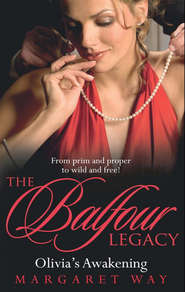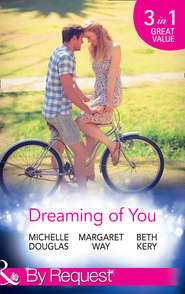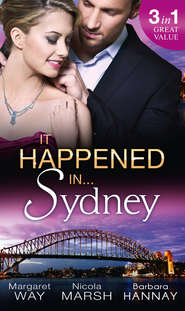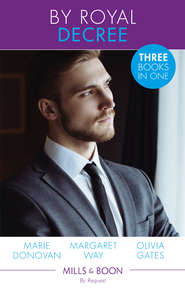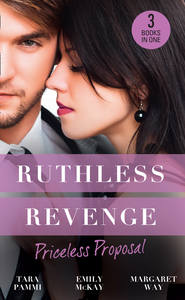По всем вопросам обращайтесь на: info@litportal.ru
(©) 2003-2025.
✖
Outback Man Seeks Wife
Автор
Год написания книги
2019
Настройки чтения
Размер шрифта
Высота строк
Поля
‘It was purely by accident I assure you,’ Natasha retorted, with familiar derision.
There was a moment’s respite from this edgy conversation while both young women followed the progress of the entries in the Jimboorie Cup, the main event in Jimboorie’s annual two-day bush picnic races. The amateur jockeys, all fine horsemen, expertly brought their mounts under control. The horses, groomed to perfection, looked wonderful Carrie thought, the familiar excitement surging through her veins. She loved these special days when the closely knit but far flung Outback community came together from distances of hundreds of miles to relax and enjoy themselves. Many winged their way aboard their private planes. Others came overland in trucks, buses or their big dusty 4WD’s sporting the ubiquitous bull bars. Outsiders joined in as well. City slickers out for the legendary good time to be had in the bush, inveterate race goers and gamblers who came from all over the country to mostly lose their money and salesmen of all kinds mixing with vast-spread station owners and graziers.
Picnic race days were a gloriously unique part of Outback Australia. The Jimboorie races weren’t as famous as the Alice Springs or the Birdsville races with the towering blood-red sand-hills of the Simpson Desert sitting just outside of town. Jimboorie lay further to the north-east, more towards the plains country at the centre of the giant state of Queensland with the surrounding stations running sheep, cattle or both.
It was early spring or what passed for spring; September so as to take advantage of the best weather of the year. Today’s temperature was 27 degrees C. It was brilliantly fine—no humidity to speak of—but hotter around the bush course, which was located a couple of miles outside the small township of Jimboorie. It boasted three pubs—what could be sadder than an Outback town with no pub, worse no beer—all full up with visiting guests; a one man police station; a couple of government buildings; a small bush hospital manned by a doctor and two well qualified nurses; a chemist who sold all sorts of things outside of pharmaceuticals; a single room school; a post office that fitted neatly into a corner of the craft shop; a couple of shoe and clothing stores; a huge barn that sold just about everything like a city hyper-dome; the office of the well respected Jimboorie Bulletin, which appeared monthly and had a wide circulation. The branch office of the Commonwealth Bank had long since been closed down to everyone’s disgust, but the town continued to boast a remarkably good Chinese restaurant and a bakehouse famous for the quality of its bread and its mouthwatering steak pies.
This afternoon the entire township of less than three thousand—a near boom town in the Outback—was in attendance, including the latest inhabitants, the publicans, Vince and Katie Dougherty’s six-month-old identical twins, duly cooed over.
The horses, all with thoroughbred blood, were the pride of the competing stations; proud heads bowed, glossy necks arched, tails swishing in nervous anticipation. This was a special day for them, too. They were giving every indication they were ready to race their hearts out. All in all, though it was hidden beneath lots of laughter, back-slapping and the deeply entrenched mateship of the bush, rivalry was as keen as English mustard.
The Jimboorie Cup had been sponsored in the early days of settlement by the pioneering Cunningham family, a pastoral dynasty whose origins, like most others in colonial Australia, lay in the British Isles. William Cunningham second son of an English upper middle class rural family arrived in Australia in the early 1800s, going on to make his fortune in the southern colonies rearing and selling thousands of ‘pure’ Merino sheep. It wasn’t until the mid-1860s that a branch of the family moved from New South Wales into Queensland, squatting on a few hundred thousand acres of rich black plains country, gradually moving from tin shed to wooden shack then into the Outback castles they eventually began to erect for themselves as befitting their social stature and to remind them of ‘Home’.
Carrie’s own ancestors—Anglo-Irish—had arrived ten years later in the 1870s with sufficient money to take up a huge run and eventually build a fine house some twenty miles distance from Jimboorie House the reigning queen. In time the Cunninghams and the McNevins and the ones who came after became known as the ‘sheep barons’ making great fortunes off the backs of the Merinos. That was the boom time. It was wonderful while it lasted and it lasted for well over one hundred years. But as everyone knows for every boom there’s a bust. The demand for Australian wool—the best in the world—gradually went into decline as man-made fibres emerged as strong competitors. The smart producers had swiftly switched to sheep meat production to keep afloat while still maintaining the country’s fine wool genetics from the dual purpose Merino. So Australia was still riding on the sheep’s back establishing itself as the world’s premium exporter of lamb.
The once splendid Jimboorie Station with its reputation for producing the finest wool, under the guardianship of the incredibly stubborn and short-sighted Angus Cunningham had continued to focus on a rapidly declining market while his neighbours had the good sense to turn quickly to diversification and sheep meat production thus optimising returns.
Today the Cup was run by a group of station owners, working extremely hard but still living the good life. Carrie’s father, Bruce McNevin, Clerk of the Course, was one. Natasha Cunningham’s father another. Brad Harper, a relative newcomer—twenty years—but a prominent station owner all the same, was the race commentator and had been for a number of years. One of the horses—it was Number 6—Lightning Boy was acting extra frisky, loping in circles, dancing on its black hooves, requiring its rider to keep a good grip on the reins.
‘He’s an absolute nothing, a nobody,’ Natasha Cunningham continued the contemptuous tirade against her cousin. She came alongside Carrie as she moved nearer the white rails. Flemington—home of the Melbourne Cup—had its famous borders of beautiful roses. Jimboorie’s rails were hedged by thick banks of indestructible agapanthus waving their sunbursts of blue and white flowers.
‘He certainly knows how to handle a horse,’ Carrie murmured dryly.
‘Why not? That’s all he’s ever been, a stockman. His father might have been one of us but his mother was just a common little slut. His father died early, probably from sheer boredom. He and his mother roamed Queensland towns like a couple of deadbeats, I believe. I doubt he’s had much of an education. Mother’s dead, too. Drink, drugs, probably both. The family never spoke one word to her. No one attended their wedding. Shotgun, Mother said.’
She would, Carrie thought, a clear picture of the acid tongued Julia Cunningham in her mind. Carrie thoroughly disliked the pretentious Julia and her even more snobbish daughter. Now she knew a moment of satisfaction. ‘Well, your great uncle, Angus, remembered your cousin at the end. He left him Jimboorie.’
Natasha burst into bitter laughter. ‘And what a prize that is! The homestead is just about ready to implode.’
‘I’ve always loved it,’ Carrie said with more than a touch of nostalgia. ‘When I was little I thought it was a palace.’
‘How stupid can you get!’ Natasha gave a bark of laughter. ‘Though I agree it would have been wonderful in the old days when the Cunninghams were the leading pioneering family. So of course we’re still important. My grandfather would have seen to Jimboorie’s upkeep. He would have switched to feeding the domestic market like Dad. But that old fool Angus never did a thing about it. Just left the station and the Cunningham ancestral home fall down around his ears. Went to pieces after his wife died and his daughter married and moved away. Angus should never have inherited in the first place. Neither should James. Or Clay as he calls himself these days. No ‘little Jimmy’ anymore. James Claybourne Cunningham. Claybourne, would you believe, was his mother’s maiden name. A bit fancy for the likes of her.’
‘It’s a nice tribute to his mother,’ Carrie said quietly. ‘He can’t have any fond memories of your side of the family.’ What an understatement!
‘Nor we for him! But the feud was on long before that. My grandad and great-uncle Angus hated one another. The whole Outback knows that.’
‘Yes, indeed,’ Carrie said, long acquainted with the tortured saga of the Cunninghams. She angled her wide brimmed cream hat so that it came further down over her eyes. The sun was blazing at three o’clock in the afternoon. A shimmering heat haze hovered over the track. ‘Look, they’re about to start.’
‘Oh goody!’ Natasha mocked the excitement in Carrie’s voice. ‘My money’s on Scott.’ She glanced sideways, her blue eyes filled with overt malice.
‘So’s mine,’ Carrie answered calmly, visibly moving Scott’s two carat diamond solitaire around on her finger. Natasha had always had her eye on Scott. It was in the nature of things Natasha Cunningham would always get what she wanted. But Scott had fallen for Carrie, very much upsetting the Cunninghams, and marking Carrie as a target for Natasha’s vicious tongue. Something that had to be lived with.
Three races had already been run that afternoon. The crowd was in fine form calling for the day’s big event to begin. There was a bit of larrikinism quickly clamped down on by Jimboorie’s resident policeman. The huge white marquees acting as ‘bars’ had been doing a roaring trade. Scott, on the strapping Sassafras, a rich red chestnut with a white blaze and white socks, was the bookies’ favourite, as well as the crowd’s. He was up against two fine riders, members of his own polo team. No one had had any prior knowledge of the riding skills of the latest arrival to their far flung bush community. Well they knew now, Carrie thought. They only had to watch the way he handled his handsome horse. It had an excellent conformation; a generous chest that would have good heart room. The crowd knew who the rider was of course. Everyone knew his sad history. And there was more! All the girls for hundreds of miles around were agog with excitement having heard the rumour, which naturally spread like a bushfire, Clay Cunningham, a bachelor, was looking for a wife. That rivetting piece of information had come from Jimboorie’s leading publican, the one and only Vince Dougherty. Vince gained it, he claimed, over a cold beer or two. Not that Clay Cunningham was the only bush bachelor looking for a wife. In the harsh and lonely conditions of the Outback—very much a man’s world—eligible women were a fairly scarce commodity and thus highly prized. As far as Carrie could see all the pretty girls had swarmed here, some already joking about making the newcomer a good wife. Perhaps Clay Cunningham had been unwise to mention it. There was a good chance he’d get mobbed as proceedings got more boisterous.
He certainly cut a fine figure on horseback though Carrie didn’t expect Natasha to concede that. The black gelding looked in tip-top condition. It had drawn almost as many admiring eyes as its rider. A fine rider herself—Carrie had won many ladies’ races and cross country events—she loved to see good horsemanship. She hadn’t competed in the Ladies’ Race run earlier that day, which she most likely would have won. She was to present the Jimboorie Cup to the winning rider. Her mother, Alicia, President of the Ladies Committee and a woman of powerful persuasion, had insisted she look as fresh as a daisy and as glamorous as possible. A journalist and a photographer from a popular women’s magazine had been invited to cover the two-day event with a gala dance to be held that night in Jimboorie’s splendid new Community Hall of which they were all very proud.
A few minutes before 3:00 p.m. the chattering, laughing crowd abruptly hushed. They were waiting now for the starter, mounted on a distinguished old grey mare everyone knew as Daisy, to drop his white flag…Carrie began to count the seconds….
‘They’re off!’ she shouted in her excitement, making a spontaneous little spring off the ground. A great cheer rose all around her, lofting into the cloudless cobalt sky. The field, ten runners in all, literally leapt from their standing start. The horses as was usual were bunched up at first. Then the riders began battling for good positions, two quickly becoming trapped on the rails. The field sorted itself out and the horses began to pound along, hooves eating up a track that was predictably hard and fast.
When the time came for the riders to negotiate the turn in what was essentially a wild bush track, half of the field started to fall back. In many ways it was more like a Wild West gallop than the kind of sophisticated flat race one would see at a city track. The front runners had begun to fight it out, showing their true grit. Scott, his polo team mates and Jack Butler, who was Carrie’s father’s overseer on Victory Downs. Clay Cunningham’s black gelding was less than a length behind Jack and going well. Carrie watched him lean forward to hiss some instruction into his horse’s ear.
‘Oh dear!’ Carrie watched with a perverse mix of dismay and delight as the gelding stormed up alongside Jack’s gutsy chestnut, then overtook him. Jack, who would have been thrilled to be among the frontliners, was battling away for all he was worth. At this rate Clay Cunningham was a sure thing, Carrie considered, unless Scott could get some extra speed from his mount. Scott was savagely competitive but the newcomer was giving every indication he’d be hard to beat. One thing was certain. Clay Cunningham was a crack rider.
Natasha, too, had drawn in her breath sharply. The possibility Scott could be beaten hadn’t occurred to either woman. Golden Boy Harper, as he was popularly known, was captain of their winning polo team and thus had a special place in Jimboorie society.
‘Your cousin looks like winning,’ Carrie warned her, shaking her own head. ‘Damn it, now, Scott! Make your move.’ Carrie wasn’t sure Scott was riding the right race. Though she would never say it, she didn’t actually consider Scott had the innate ability to get the best out of a horse. He didn’t know much about coaxing for one thing.
Natasha belted the air furiously with her fist. ‘This shouldn’t be happening.’
‘Well it is!’ Carrie was preparing herself for the worst.
She saw Scott produce his whip, giving his horse a sharp crack, but Clay Cunningham was using touch and judgment rather than resorting to force. It paid off. The big black gelding had already closed the gap coming at full stride down the track.
‘Damn it!’ Natasha shrieked, looking ready to burst with disappointment.
Carrie, on the other hand, was feeling almost guilty. She was getting goose bumps just watching Clay Cunningham ride with such authority that Scott’s efforts nearly fell into insignificance. That feeling in itself was difficult to come to grips with. The fast paced highly competitive gelding, like its rider, looked like it had plenty left in reserve.
Carrie held her breath, still feeling that upsurge of contrasting emotions. Admiration and apprehension were there aplenty. Sharp disappointment that Scott, her fiancé, wasn’t going to win. Elation at how fast the big gelding was travelling—that was the horse lover in her she told herself. That animal had a lot of class. So did its rider. There was a man determined to win. After the way Jimboorie had treated him, Carrie couldn’t begrudge him the victory. She liked a fighter.
Two minutes more, just as she expected, Lightning Boy flew past the post with almost two full lengths in hand.
What a buzz!
‘Oh, well done!’ Carrie cried, putting her hands together. For a moment she forgot she was standing beside Natasha, the inveterate informer. ‘I wonder if he plays polo?’ What an asset he would be!
‘Of course he doesn’t play polo,’ Natasha snapped. ‘He’s a pauper. Paupers don’t get to play polo. Where’s your loyalty anyway?’ she demanded fiercely. ‘Scott’s your fiancé and you’re applauding an outsider.’
‘Insider,’ Carrie corrected, looking as cool as a cucumber. ‘He’s already moved into Jimboorie.’
‘For now.’ Natasha made no effort to hide her outrage and anger. ‘Just see if people deal with him. My father has a great amount of influence.’
Carrie frowned. ‘What are you saying? Your family is readying to make life even more difficult for him?’
‘You bet we are!’ Natasha’s blue eyes were hard. ‘He’d be mad to stay around here. Old Angus only left him Jimboorie to spite us.’
‘Be that as it may, your cousin must intend to stick around if he’s looking for a wife,’ Carrie said, really pleased that after a moment of stunned silence the crowd erupted into loud, appreciative applause and even louder whistles. They were willing to give the newcomer a fair go even if Natasha’s vengeful family weren’t. ‘Well there you are!’ she said brightly. ‘No one rated his chances yet your cousin came out the clear winner.’
‘We’ll see what Scott has to say,’ Natasha snorted with indignation, visibly jangling with nerves. ‘For all we know there could have been interference near the fence.’
‘There wasn’t.’ Carrie dismissed that charge very firmly. ‘I know Scotty doesn’t like to lose, but he’ll take it well enough.’ Some hope, she thought inwardly. Her fiancé had a considerable antipathy to losing. At anything.
‘I’ll be sure to tell him how delighted you were with my cousin’s performance,’ Natasha called quite nastily as she walked away.
‘I bet you will,’ Carrie muttered aloud. Since she and Scott had become engaged, two months previously, Natasha always gave Carrie the impression she’d like to tear her eyes out.
A tricky situation was now coming up. It was her job, graciously handed over to her by her mother, to present the Cup. Not to Scott, as just about everyone had confidently expected, but to the new owner of historic Jimboorie Station. The Cunningham ancestral home was falling down around his ears and the once premier cattle and sheep station these days was little more than a ruin said to be laden with debt. In all likelihood the new owner would at some stage sell up and move on. But for now, she had to find her way to the mounting yard for the presentation and lots of photographs. Come to that, she would have to take some herself. For two years now since she had returned home from university she had worked a couple of days a week for Paddy Kennedy, the founder and long time editor of the Jimboorie Bulletin. Once a senior editor with the Sydney Morning Herald, chronic life-threatening asthma sent him out to the pure dry air of the Outback where it was thought he had a better chance of controlling his condition.






